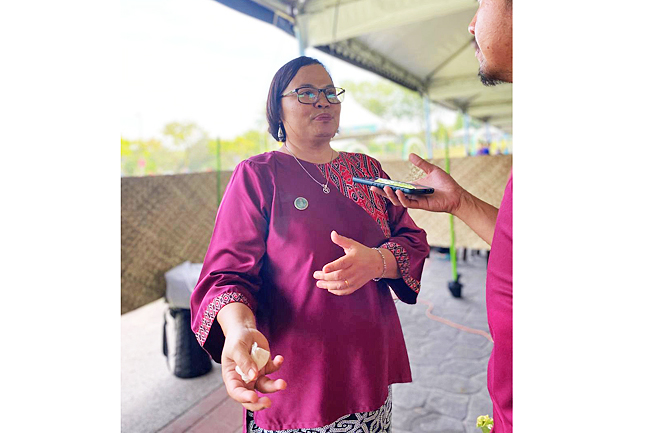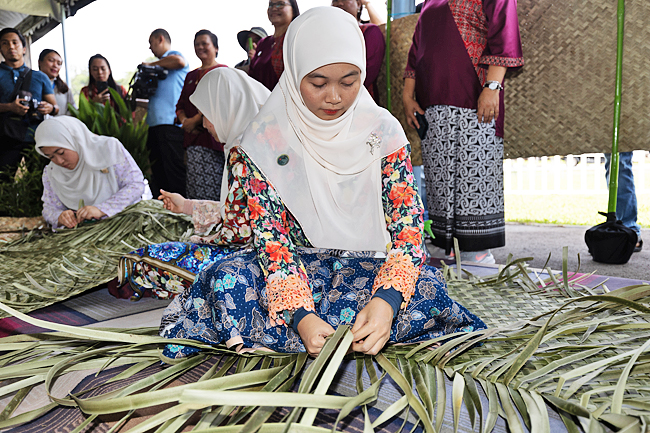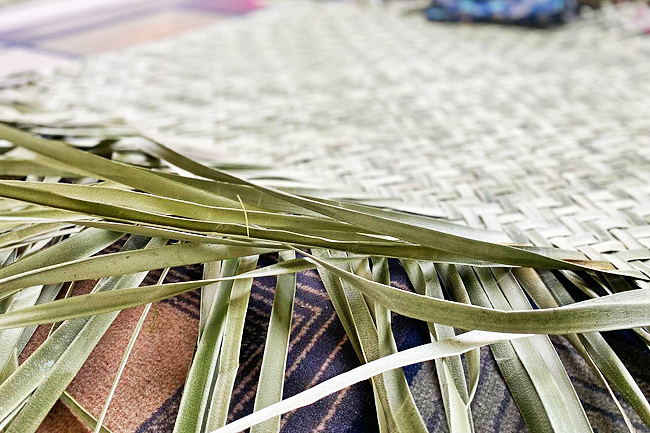Salmah anak Ampili was huddled tightly against her mother as they sat under the shelter of a hut that overlooked their paddy plantation. She was just six years old and yet, the memory was as clear as day, or rather, as dark as night.
With an oil lamp by their side, the now 53-year-old Salmah recalled the nights her mother spent patiently weaving baskets and mats using mengkuang (screwpine) leaves that have been stripped of its thorns, split into long strands, soaked and finally dried in the sun.
‘Pokok Mengkuang’ or its botanical name, pandanus artocarpus is a large pandan-like plant that grows along the back of mangroves and jungles of Southeast Asia and the Pacific islands. As a traditional craft material, the screwpine leaves are known for its durability and flexibility.
“It’s a craft that has been passed down through generations in the Iban community. In our village, most of the weaving was done in the wild hills where we grew our paddy,” said Salmah, a member of the Kampong Sibut Longhouse in Temburong District.
“It was a way for the women in our community to past the time, while waiting for the paddy to mature,” she told the Weekend Bulletin on the sidelines of a royal get-together ceremony in the Green Jewel recently.
Salmah and her sisters were part of a historic first, mentoring a small group of Temburong youth to weave the Sultanate’s longest screwpine mat which stretched at a whopping 77 feet-and-one-inch.



“We are grateful to be given the opportunity to share our ancestral craft and to pass it on to the youth of Temburong, especially now when people are starting to recognise the value – both culturally and economically – of such traditional crafts,” continued Salmah.
According to the weaver, previously a 10×10 feet screwpine mat was valued at just BND10.
In contrast a five by five feet mat now can fetch up to BND20, reflecting not only a rise in commercial value but also an increase in demand.
On the preservation of the craft, Salmah noted how despite its prevalence within the older womenfolk, there may be numerous skilled weavers across the country that have yet to be discovered or trained in the traditional art.
“There are definitely diamonds in the rough out there and I hope that what we are doing here can inspire those, who have that spark of interest (in the craft), to step up and get involved because it is only by doing so that we discover our passion and love for it,” she went on to say.
One of these ‘diamonds’ is Sairah Salamat, a Temburong youth and one of the four mentees of the longest screwpine mat project.
At 28 years, she is no stranger to breaking national records revolving around the tradition. Last year, she was also involved in making Brunei’s longest chain of kelupis, where a total of 7,676 kelupis were made and braided together.
“I am someone who likes to learn new things and is not afraid of a challenge. I’m also passionate about preserving our heritage, especially within the realms of arts and craft. I don’t want to see them disappear,” she said.
She felt that it was part of her duty as a youth to participate in these kinds of projects as a means to not only learn the traditional craft, but to understand it and recognise the value in it.
“Of course, we (the participants) were nervous in the beginning, because it is something we have never done, but our mentors were very supportive, guiding us through our mistakes and keeping us focused on honing our skills,” she added.
“When I was little, my late grandmother also weaved, but as Malays, the material was different, it was rattan. So I was inspired by that memory, and I always wanted to learn,” she shared, noting that she had limited opportunities before.
“I hope this project would help inspire other youth as well, to take up these traditional crafts and maybe make it as hobby or as a potential source of income. Now that I have learned how to weave screwpine mats, I hope to pass it down to my own children in the future,” she concluded. – Wardi Wasil






